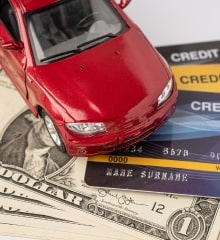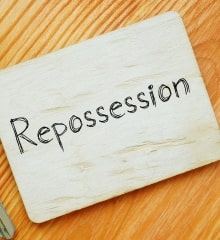Updated on 20 May 2025
Charged Off Debt: What It Really Means and How Bankruptcy Can Help
What is Charged-Off Debt?
Charged-off debt is really just a tricky accounting term. When debts or assets are “charged off,” it simply means they have been removed from a balance sheet.
What Happens When an Account is Charged-Off
When a creditor or lender charges-off an account, it means they have given up on collecting the debt and consider it unlikely to be repaid. This action doesn't mean the debt is forgiven or erased. Here's what typically happens when an account is charged-off:
First, the account status is on your credit report is changed to show that it has been charged-off. This notation negatively affects your credit score and remains on your credit report for seven years from the date of the first delinquency that led to the charge-off. The significant impact to your credit score makes it harder to qualify for new credit, secure favorable interest rates, or get approved for loans in the future.
The creditor might handle the charged-off debt in various ways. They may sell the debt to a collection agency for a fraction of the amount owed. Or they might continue trying to collect the debt through their in-house collections department or use third-party collection agencies.
To collect the debt, they might use a collection agency, which will typically mean you will receive phone calls, letters, or other communications from them demanding payment. They might offer settlement options or payment plans to resolve the debt.
If the debt remains unpaid and the creditor or collection agency deems it worthwhile, they might take legal action against you to secure a judgment. This can result in wage garnishment, liens on property, or other legal remedies to recover the debt.
Additionally, the charged-off amount might be considered as income for tax purposes. The IRS might expect you to report the forgiven debt as income, though there are exemptions and certain conditions under which this might not apply.
Remember, while a charge-off is a severe negative mark, it is in your best interest to address the debt. It is wise to consult with an experienced attorney to help you understand your options.
What is bad debt?
The term bad debt is typically used to describe money owed that is unlikely to be recovered or repaid, usually because the borrower is unable to pay the debt. In the context of personal finance, bad debt usually includes unsecured obligations such as credit card balances, payday loans, medical bills, and personal loans, especially when they carry high interest rates and are not tied to an appreciating asset.
Unlike good debt, which is often associated with investments like mortgages or student loans, bad debt can quickly accumulate and become difficult to manage, particularly if a person experiences an economic hardship, job loss, or unexpected medical emergencies.
From a legal perspective, bad debt can lead to collections, lawsuits, wage garnishment, or even judgments, which can significantly impact a person’s financial stability and credit standing.
The Consequences of Charged-Off Debt
Let’s say you haven’t paid your credit card debt in six months. At some point, the creditor can no longer carry it on their books as a current asset. Therefore, their accountant takes it off the books; in other words, they charge it off. While the debt may no longer be your creditor’s problem, it is most certainly still your problem. Oftentimes, creditors will get rid of bad debts by selling or transferring them to a collection agency or debt buyer. That’s when the harassment starts.
The Impact of Charge-Offs on Your Credit
Besides setting you up for a barrage of phone calls and letters from determined debt collectors, unpaid charge-offs will deeply damage your credit score. When an account is charged-off, it’s one of the most detrimental entries on your credit report, which can cause your score to drop significantly, potentially by 100 points or more.
The only thing worse than being late on your debts is not paying them at all, and lenders and prospective landlords and employers who see a charged-off debt won’t give you the time of day. Future creditors view charge-offs as a red flag, indicating a history of financial irresponsibility or an inability to manage debts. This perception can make it harder to rebuild trust and obtain credit in the future. Even if you do manage to qualify for new credit with a charge-off on your report, lenders might offer less favorable terms, such as higher interest rates or lower credit limits, due to the perceived risk associated with your credit history.
Additionally, landlords and employers often check credit reports as part of their screening process. A charge-off might negatively impact your ability to rent a home or secure certain job opportunities.
Once a debt has been charged off, it will remain on your credit report for seven years. That’s a long time to suffer the consequences of delinquent debt. Though states have various statutes of limitations for collecting on unpaid accounts, most will allow creditors to sue in court for up to three to six years.
Why You Shouldn't Ignore Charged-Off Debt
Having your debt charged off isn’t an excuse to ignore it. If anything, it is a wake-up call that you need to do something about your debt situation. Ignoring your debt will only make the problem worse. The longer you go without making payments, the more damage it will do to your credit score, and the more aggressive debt collectors will become in their efforts to collect.
Filing for Bankruptcy and Charged-Off Debt
Should you decide to file for bankruptcy, it is important to include any charged-off debts. A Chapter 7 bankruptcy plan can eliminate unsecured debts like credit card debt completely.
Additionally, the automatic stay that goes into effect when you file prevents creditors or debt collectors from contacting you directly.
Bankruptcy: The Solution for Debt Relief
When you file for bankruptcy, you no longer owe money after your debts are discharged. But when you live with a charge-off, you’re taking a gamble that whoever is currently holding your debt won’t come after you – and the odds aren’t in your favor.
Bankruptcy is the only solution guaranteed to lower or eliminate debt – and usually the trouble that goes along with it. The sooner you face your financial struggles, the sooner you can overcome them. Bankruptcy can help.
Additional Tips for Managing Charged-Off Debt
If you have charged-off debt, there are a few things you can do to manage the situation:
-
Contact your creditors – Try contacting your creditors and see if you can negotiate a settlement or a payment plan that works for you. While they may not always be willing to work with you, it’s worth a shot.
-
Check your credit report – Make sure the charged-off debt is accurately reflected on your credit report. If there are any errors, dispute them with the credit reporting agency.
-
Seek help – If you’re overwhelmed by debt, seek the help of a professional. A credit counselor or bankruptcy attorney can help you understand your options and create a plan for managing your debt.
Seek Help from Experienced Bankruptcy Attorneys
Contact DebtStoppers today to speak with an experienced bankruptcy attorney about your options for finding financial freedom.
How long are charge offs on your credit report?
A charge-off happens when a creditor determines that a debt is unlikely to be collected and writes it off as a loss. However, just because the debt is charged off does not mean the consumer no longer owes the debt; the creditor may still pursue payment, or the account may be sold to a debt collection agency.
From a credit reporting standpoint, a charge-off is considered a serious negative mark that can impact your credit score. Charge-offs typically remain on your credit report for seven years from the date of the first missed payment that led to the default. This seven-year period applies regardless of whether you later pay the debt or settle it with the creditor. It is also important to know that paying off a charge-off won’t remove it from your credit history, but it can improve your overall credit profile by showing future lenders that you did pay off the debt.
Understanding the Different Types of Bankruptcy
Bankruptcy is a complex process, and it's important to understand the different types of bankruptcy available to you. Chapter 7 bankruptcy is designed for individuals who have little or no disposable income, while Chapter 13 bankruptcy is for individuals who have a regular income but are struggling with debt. There are also other types of bankruptcy, such as Chapter 11 for businesses and Chapter 12 for farmers and fishermen.
The Bankruptcy Process: What to Expect
If you are considering bankruptcy, it is important to know what to expect from the process. Generally, you'll need to provide detailed financial information to the court, attend credit counseling, and attend a meeting with creditors. You'll also need to complete a debtor education course before your debts can be discharged.
The Pros and Cons of Filing for Bankruptcy
While bankruptcy can provide relief from overwhelming debt, it's important to consider the pros and cons before filing. On the positive side, bankruptcy can stop creditor harassment, eliminate certain debts, and give you a fresh start. However, it can also damage your credit score, make it harder to get credit in the future, and involve significant legal fees.
Alternatives to Bankruptcy
Bankruptcy isn't always the best solution for everyone. Depending on your situation, there may be other options available, such as debt consolidation, debt settlement, or credit counseling. These alternatives can help you get your debt under control without the negative consequences of bankruptcy.
Working with a Bankruptcy Attorney
If you're considering bankruptcy, it's important to work with an experienced bankruptcy attorney who can guide you through the process and help you make the best decisions for your situation. A bankruptcy attorney can also help you understand the different types of bankruptcy available to you and the pros and cons of each option.
Rebuilding Your Credit After Bankruptcy
While bankruptcy can have a negative impact on your credit score, it is not the end of the road. There are steps you can take to rebuild your credit after bankruptcy, such as paying your bills on time, monitoring your credit report, and using secured credit cards responsibly. With time and effort, you can improve your credit score and regain your financial stability.
Managing Your Finances After Bankruptcy
After your debts have been discharged, it's important to develop good financial habits to avoid falling back into debt. This may include creating a budget, building an emergency fund, and avoiding unnecessary expenses. By managing your finances responsibly, you can build a strong financial foundation and avoid the pitfalls of debt in the future.
Conclusion: Taking Control of Your Financial Future
Whether you're dealing with charged-off debt or other financial struggles, it's important to take control of your financial future. Bankruptcy can be a powerful tool for getting your debt under control, but it is important to weigh the pros and cons and consider alternatives before filing. With the help of a bankruptcy attorney and good financial management, you can take the first steps toward financial freedom.


